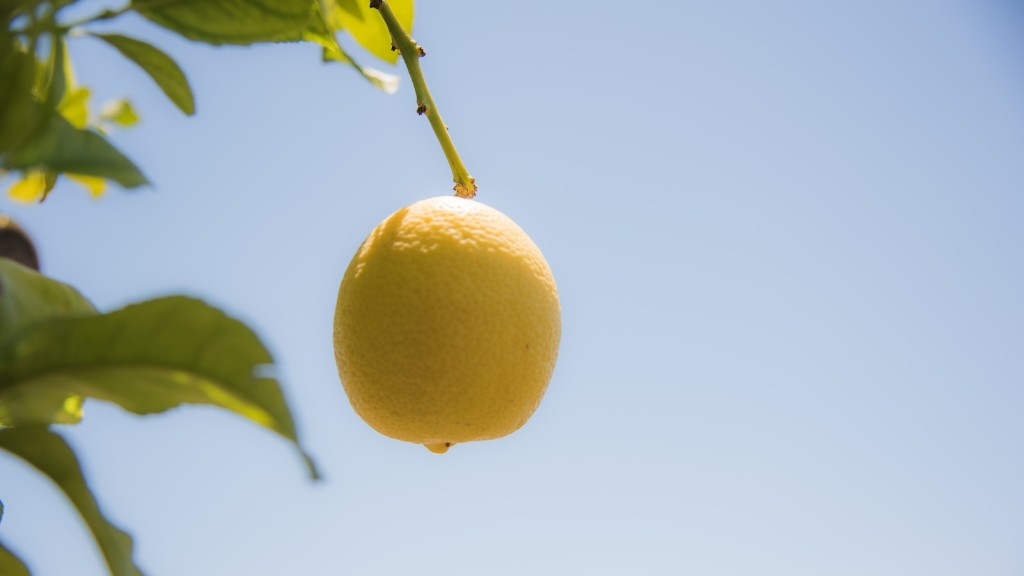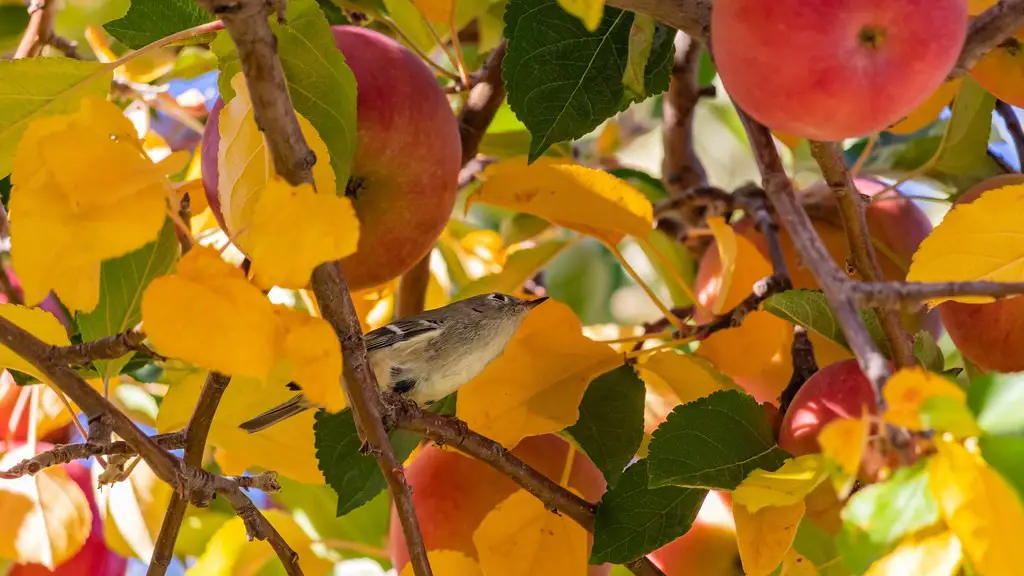Potted lemon trees can be a great way to bring a piece of the tropics into your home. Growing lemons in pots requires proper care and attention; this includes understanding when the right time is to fertilize the plant. There are several key factors in determining when to fertilize your potted lemon tree; this includes the current soil nutrient levels and the season. Knowing what to look for and when to apply the fertilizer will ensure a healthy and productive lemon tree.
The most important time to fertilize a potted lemon tree is in early spring. This is the time when the new growth of the tree is starting and it is important to replenish the nutrients in the soil. When applying fertilizer to your potted lemon tree, it is important to use a balanced fertilizer with NPK (nitrogen, phosphorus and potassium) ratio of 8-8-8. This type of fertilizer is important for healthy growth and ensuring that all of the necessary nutrients are available for the tree to thrive.
It is important to remember that the tree should only be fertilized twice throughout the growing season; once in early spring before the growth of new leaves and again in late summer when the fruit is beginning to ripen. It is also important to stop fertilizing during the winter months when the tree enters its dormant period. Too much fertilizer in the winter months will not help the tree, and can cause damage to the roots.
When fertilizing your potted lemon tree, make sure to water it thoroughly before and after the process. This will help the fertilizer spread evenly throughout the soil, and it will also prevent any fertilizer clumping. It is also important to use a light hand when applying the fertilizer; too much will burn the tree and too little will not provide the nutrients necessary for growth.
Using a slow Release Fertilizer is also a great way to make sure that your potted lemon tree doesn’t get over fertilized. Slow release fertilizers are designed to slowly release their nutrients over an extended period of time, thus providing more consistent nourishment for the tree. Applying these fertilizers in the early spring and late summer can help ensure that your potted lemon tree has all the nutrition it needs to thrive.
Soil pH and Macronutrients
In order to determine if your potted lemon tree needs to be fertilized, it is necessary to understand the soil pH levels and macronutrient content of the soil. Soil pH levels should range between 6.5 and 7.5. If the pH level is outside of this range, it is important to apply the necessary amendments to bring it back in line. Additionally, it is necessary to know the ‘macronutrient’ content of the soil, which includes nitrogen, phosphorus, and potassium. By testing the soil, you can determine the content of these nutrients and decide if adding a fertilizer is needed or not.
Inspecting the soil visually can also help you make a decision as to whether fertilizing your potted lemon tree is needed. If the soil appears light in color and is not holding any moisture, it is likely the soil does not have the necessary nutrients for your lemon tree to thrive, and fertilization is needed. Conversely, if the soil is dark in color and easily holds moisture, then it is likely the soil has the necessary nutrient levels and there is no need to fertilize.
It is also important to keep an eye on the tree itself. If the leaves are pale or yellow, then it is likely that the soil is lacking in essential nutrients and fertilizer is needed. Another key indicator of nutrient deficiency is poor growth, as this is often an indication of a lack of nutrients in the soil. Making sure to check your potted lemon tree regularly and making sure it is receiving enough nutrients is the best way to ensure your tree remains healthy and productive.
By knowing when it is time to fertilize your potted lemon tree, you can be sure that your tree has all of the necessary nutrients it needs to flourish. Regular testing of the soil pH and macronutrient content can help you determine when to fertilize your lemon tree. Additionally, visually examining the soil and watching for changes in the tree’s leaves can provide key indicators as to when it is time to fertilize. With proper care and attention, your potted lemon tree can provide you with years of enjoyment and productivity.
Time of Year
The time of year can also influence when it is best to fertilize your potted lemon tree. Although applying fertilizer in early spring is the optimal time, it is not the only time to apply a fertilizer. Applying a fertilizer in late summer or early autumn will also help ensure that your lemon tree has all of the necessary nutrients. Applying a fertilizer in the fall can also help the tree prepare for the winter months when it enters a dormant period.
When deciding what fertilizer to use for your tree, organic options are usually the best way to go since they are more natural and do not contain any synthetic chemicals. They also help to improve the soil’s overall condition. Additionally, organic fertilizers are better for the environment since they are free of harsh chemicals. There are several types of organic fertilizers available for citrus trees, including fish emulsions, alfalfa pellets, and compost teas.
It is also important to note that it is best to use an all-purpose fertilizer, as opposed to one that is specific to citrus trees. If you are using a specific lemon tree fertilizer, then make sure to follow the instructions on the label. Too much fertilizer can damage the tree, so it is important to follow the instructions carefully.
Once you have applied the fertilizer, it is important to monitor the tree’s response. If the tree is not responding positively to the fertilizer, then it is best to stop fertilizing the tree or reduce the amount of fertilizer applied. If the tree responds positively, then you can continue fertilizing the tree as normal.
By understanding when the best times to fertilize your potted lemon tree are, you can help ensure that your plant receives the nutrients it needs to thrive. Being aware of the soil’s nutrient levels and the season will ensure that you are providing your lemon tree with the best care possible.
Now Is The Time To Do It
Now is the perfect time to start fertilizing your potted lemon tree. With the change of the seasons and the rising temperatures, the tree is starting to come out of its dormant period and will be in need of additional nutrients. Understanding the soil pH levels of your tree will ensure that you know what you should be adding to the soil, and that you are not over-fertilizing the plant. Regularly monitoring the soil and the tree will ensure that the lemon tree is getting the nutrition it needs to remain healthy and productive.
When fertilizing your potted lemon tree, take care not to over-fertilize since this can damage the tree. Be sure to use a balanced fertilizer and apply it according to the instructions on the label. Additionally, be sure to water the tree thoroughly before and after applying the fertilizer. It is also important to monitor the response of the tree to the fertilizer and adjust the application as necessary.
Fertilizing your potted lemon tree can be a great way to ensure that it has the nutrition it needs to remain healthy and productive. Regularly monitoring the soil and tree, as well as applying a balanced fertilizer at the right times of year, can help ensure that your potted lemon tree has all of the nutrition it needs to remain healthy and productive.
Knowing when and how to fertilize your potted lemon tree is key to keeping it healthy and productive. With the correct care and attention, your lemon tree will be a great addition to your home, bringing with it a taste of the tropics.
Types of Fertilizer
In order to determine which type of fertilizer to use for your potted lemon tree, it is important to understand the pros and cons of each type. Organic fertilizers are usually the best choice as they are free of synthetic chemicals and are more natural. Organic fertilizers also help to improve the soil’s overall condition, making it more suitable for growing a healthy and productive lemon tree. Common organic fertilizers for citrus trees include fish emulsions, alfalfa pellets, and compost teas.
Synthetic fertilizers are another option that can be used to fertilize a potted lemon tree. These fertilizers are convenient and easy to use, and they often contain more nitrogen than organic fertilizers. However, synthetic fertilizers can be harmful to the environment and can cause an imbalance of the soil’s pH levels. For these reasons, it is best to avoid synthetic fertilizers and opt for an organic one if possible.
It is also important to consider the amount of fertilizer you are using. Too much fertilizer can damage the tree, so it is important to follow the instructions on the fertilizer label. If you are using a specific lemon tree fertilizer, make sure to read the label carefully and follow the directions. If you are using an all-purpose fertilizer, it is best to use a light hand when applying the fertilizer; too much will burn the tree and too little will not provide the nutrients necessary for growth.
By understanding the types of fertilizer available and adjusting the application amount accordingly, you can be sure that your potted lemon tree is getting all of the nutrients it needs to remain healthy and productive. Knowing when and how to fertilize can help ensure that your potted lemon tree has all of the nutrition it needs to remain healthy and productive.
Fertilizer Application
When applying fertilizer to your potted lemon tree, it is important to make sure you are following instructions carefully. Depending on the kind of fertilizer you are using, the instructions may vary slightly. Generally, the fertilizer should be applied to the surface of the soil around the base of the tree. It is important not to apply the fertilizer directly onto the trunk of the tree as this can cause damage. Additionally, be sure to water the tree thoroughly before and after applying the fertilizer.
It is also important to take into consideration the type of soil you have. Sandy soil can be difficult to keep fertilized since nutrients leach out quickly. A slow release or controlled release fertilizer can be a great option for sandy soils as these fertilizers are designed to slowly release their nutrients over an extended period of time, providing more consistent nourishment for the tree. For other types of soil, a regular fertilizer can be used.
Once you have applied the fertilizer, it is important to monitor the response of the tree. If the tree is not responding positively to the fertilizer, then it is best to stop fertilizing the tree or reduce the amount applied. If the tree responds positively, continue fertilizing the tree as normal.
By taking the time to understand when and how to fertilize your potted lemon tree, you can ensure that your tree has all of the nutrients it needs to remain healthy and productive. With the correct care and attention, your lemon tree will be a great addition to your home, bringing with it a taste of the tropics.



